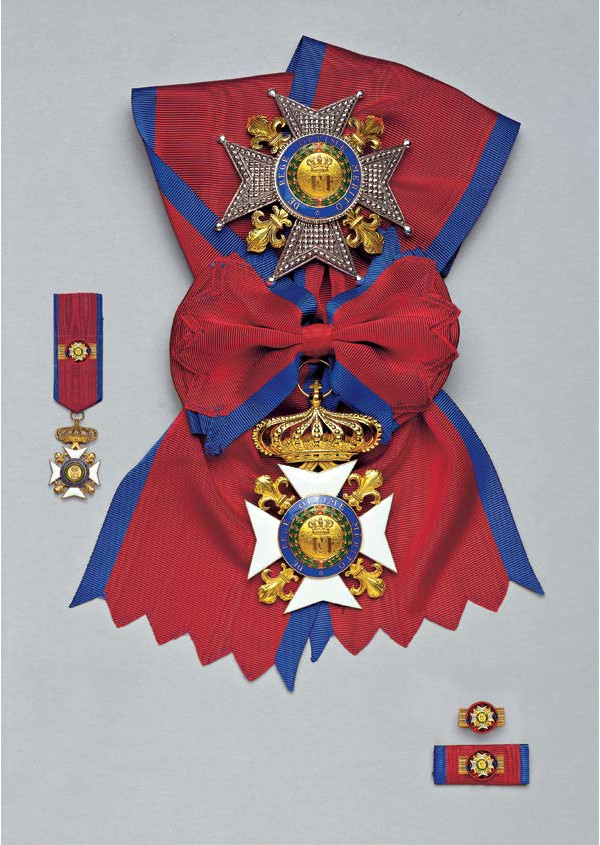Royal Order of Francis I
 The Royal Order of Francis I much like the Sacred Military Constantinian Order, a separate Order of Knighthood was established and recognised by decree on 28 September 1829 as a Royal Order principally to reward civil merit on the part of government, diplomats, military officials and clerics, in addition to those who had made achievements in commerce, the sciences, arts, letters and literature. The Royal Order of Francis I has never been exclusively Roman Catholic in origin and its knights and dames need not profess the Roman Catholic Faith, although they are expected to participate in the humanitarian and charitable activities of the dynastic orders of the Royal House of Bourbon Two Sicilies.
The Royal Order of Francis I much like the Sacred Military Constantinian Order, a separate Order of Knighthood was established and recognised by decree on 28 September 1829 as a Royal Order principally to reward civil merit on the part of government, diplomats, military officials and clerics, in addition to those who had made achievements in commerce, the sciences, arts, letters and literature. The Royal Order of Francis I has never been exclusively Roman Catholic in origin and its knights and dames need not profess the Roman Catholic Faith, although they are expected to participate in the humanitarian and charitable activities of the dynastic orders of the Royal House of Bourbon Two Sicilies.
Today membership of this Order includes senior figures from all Christian denominations, as well as Muslims and Jews.
Inter-Religious Dialogue
The Royal Order of Francis I, together with its sister Order, the Sacred Military Constantinian Order of St George, continues to lead the way among lay Catholic knightly associations and brotherhoods, in its commitment to inter-church and inter-faith dialogue.
Among important initiatives there was significant engagement with other Christian churches and the leaders of Muslim and Jewish religious communities in dialogue projects.
Among these are the adoption for charitable purposes and financial support of the Forthspring Community Centre in Belfast which works to bridge the Roman Catholic-Protestant divide in Northern Ireland.
During 2004, the Royal Order of Francis I, together with its sister dynastic order, the Sacred Military Constantinian Order of Saint George, led a high level interfaith dialogue delegation to Syria, Lebanon and Yemen. The delegation which was headed by the Order’s then Grand Prefect, HRH The Duke of Castro, undertook a series of important engagements in each country including interfaith dialogue seminars with Christian and Muslim leaders and spiritual visits to key Christian and Muslim places of worship.
Currently the Royal Order of Francis I, is launching a series of initiatives which will include the exchange of Christian, Muslim and Jewish leaders between Europe and the Arab world, and the hosting of meaningful interfaith seminars in key European capitals. Most recently this included activities in Serbia and Montenegro and a London based conference for British and Bulgarian faith and civil leaders.
Charity, Humanitarian and the Arts
Much like the Order of Saint Januarius and the Sacred Military Constantinian Order of Saint George, the Royal Order of Francis I remains an ancient, dynastic and internationally recognised institution. The Order, which is neither a state decoration of the Italian Republic or the Holy See, has continued to be conferred long after the overthrow of King Francesco II, in 1861. Today the Order is bestowed by HRH The Duke of Castro, as Head of the Royal House of Bourbon of the Two Sicilies, and a great-great-great-great grandson of the Order’s founder.
Numerous states and dynasties across the world recognises the Order activities and the significant contribution its makes to charitable and humanitarian initiatives. In addition recognition has been extended by numerous state or dynastic bodies in relation to the important work it undertakes in promoting inter-church and inter-faith dialogue across Europe and around the world.
Today, the knights and dames of the Royal Order of Francis I, together with the members of the Sacred Military Constantinian Order, support and actively participate in the Order’s national and international inter-church, inter-faith, humanitarian, hospitaller and charity initiatives and projects.
The Royal Order of Francis I is bestowed upon worthy individuals regardless of nationality or creed who have contributed to public life, science, the arts, agriculture, and commerce.
The Order also plays a significant role in recognising those that have made outstanding contributions to inter-faith and inter-church dialogue and understanding. All principal faiths and denominations are represented at both delegation and international level.





